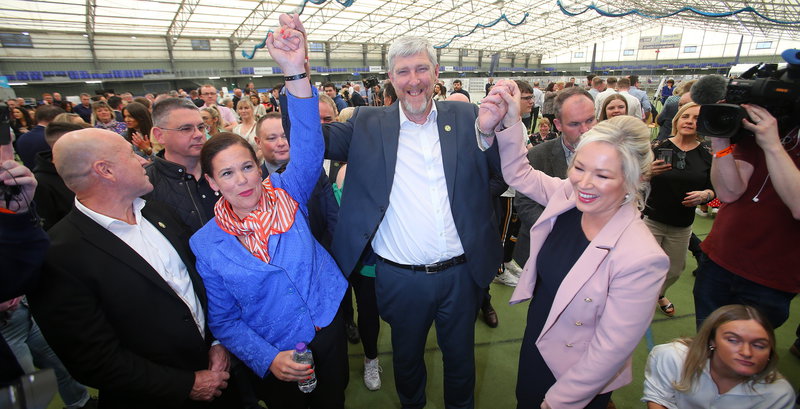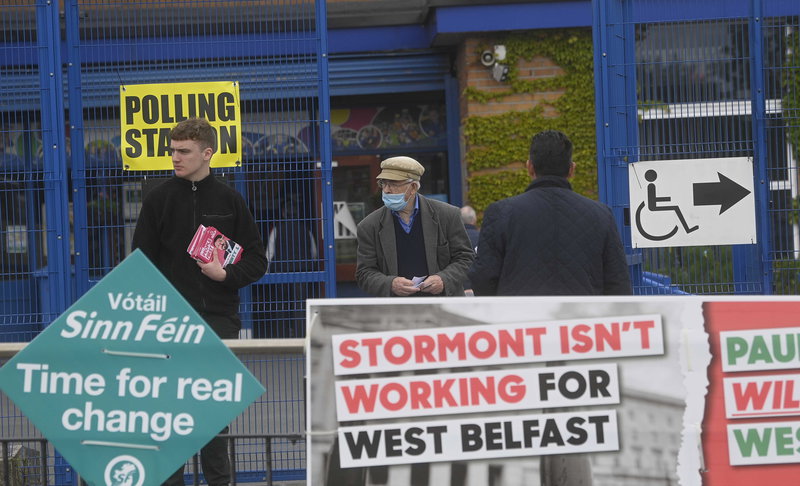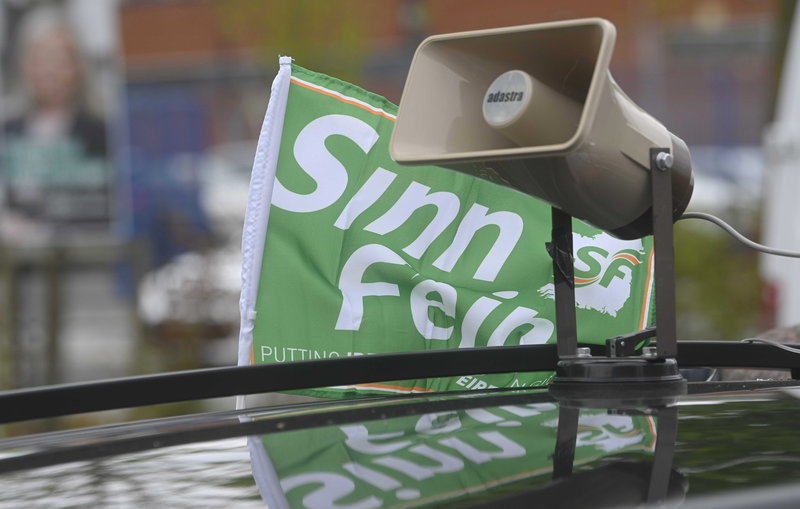Analysis
NEARING A BREAK FROM THE UK
Sinn Féin’s victory in Northern Ireland is a further step towards the reunification of Ireland and the break-up of the union of the four nations that make up the UK (England, Northern Ireland, Wales and Scotland), initiated with Brexit. Sinn Féin’s victory in the Irish general elections of 1918 provoked the war of independence between Ireland and the United Kingdom, which ended with the forming of the republic and partition of the island in 1921. Now, for the first time, the Republicans have been victorious in the regional elections. Three factors explain the victory: the emergence of a “new” Sinn Féin, the demise of the unionists and demographic changes.
The shaping of a new Sinn Féin, the former political arm of the IRA, began in 2018 when Irishwoman Mary Lou McDonald, 53, and Northern Irishwoman Michelle O’Neill, 45, replaced Gerry Adams and Martin McGuinness, who had just died, at the head of the party and disassociated it from the shadow of the armed struggle. Since then, it has risen both north and south of the border. Sinn Féin was the most voted party in the Irish elections of 2020, ahead of the two major conservative parties, Fianna Fáil and Fine Gael, which ended up forming a coalition government. Despite failing to take power, Sinn Féin introduced the debate on a consultation over a united Ireland, and both Fianna Fáil and Fine Gael have begun to position themselves in favour. Sinn Féin presented a left-wing programme focused on public health and housing, which proved very attractive to the population in the South and has now been repeated in Northern Ireland, where there is a left-wing government, like the SNP, which has ruled Scotland for twenty years.
The crisis in the DUP – the radical British unionists – began with Brexit. They were the only party in Northern Ireland to support it. The UUP, for example, the moderate unionists, opposed it in anticipation of the current problems. After the Brexit vote, in the British general election of 2017, the British Conservatives of Theresa May lost the majority and had to partner with the DUP to govern in London, a decision that did not sit well with the Republicans, who continue to refuse to occupy their seats in the UK Parliament.
Johnson’s betrayal
During the Brexit negotiations, Brussels demanded that the UK move the border with the EU to the coast that separates Northern Ireland from Britain and impose controls on British products, which would later become known as the protocol. It was the only way to avoid a hard border in Ireland, one of the terms of the 1998 peace deal between Irish Republican Catholics and British Unionist Protestants that ended thirty years of armed conflict between the two sides. However, the DUP blocked the pact, until the hard Brexiteers – Tories – expelled May and pushed Johnson to pursue a radical Brexit in 2019.
Johnson accepted the protocol, and so betrayed the unionists, enabling him to close a Brexit deal and win the general election. “Johnson personally told me that after accepting the protocol, he would change it,” said Ian Paisley, a DUP MP in London last year. When Brexit was implemented on January 1, 2021, the protocol went into effect, and unionists and loyalists protested and rioted in Northern Ireland. The pro-British loyalist paramilitary groups announced that they were abandoning the peace agreements, demanding that Johnson remove the protocol. Part of the DUP crisis is also due to the fact that it is an ultra-religious party, linked to the Ulster Free Presbyterian Church, which opposes abortion, gays and divorce, and many young voters have opted for the Alliance, a non-sectarian, central force, more in tune with today’s society.
The demographic factor
The third factor is demographics. When Northern Ireland was created in 1921, only 35% of the population were Catholic. Harsh discrimination then began against this Catholic minority, which led to a series of protests in 1968 to demand the right to vote and social housing, and an armed conflict that lasted thirty years and left 3,200 dead and 50,000 wounded. In recent decades, the Catholic population has grown, surpassing the Protestant population for the first time in 2011, and now only two of the six counties have a Protestant majority.
Even though it was on the agenda, Sinn Féin did not talk about the reunification referendum during the campaign, wanting to focus on social policies, the food and energy price crisis. It was the unionists who accused the Republicans of wanting reunification, in an attempt to bring the sectarian factor to the vote. Sinn Féin says that Brexit has changed society and that a consultation is the only solution, but they do not want to impose it. They are convinced that it will end up happening naturally because the social, political and demographic reality will lead to it. The 1998 peace accords stipulate that if at any time it is felt that a Catholic majority wants to be part of Ireland again, a consultation should be allowed. Only the British government can authorise it though. There would be two consultations, one in Northern Ireland and one in the Republic, and both would have to win. Polls say that 62% would vote yes in the south and 66% in the north, but that voters want the consultation to be done in the next ten years, not immediately.
The English perspective
During the 2016 Brexit campaign, in the most anti-European English cities, when asked why they supported Brexit, most citizens explained that they were doing so to regain control of borders and institutions and to resume trade relations with their ex-colonies. And when asked about the risk of the Scots and Northern Irish leaving, they said they did not care. According to one poll, 49% of English people would actually like to see the union dissolved.
The EU has warned of the harsh Brexit consequences for Northern Ireland resulting from Johnson’s negotiations. Everyone in the UK, and politicians in particular, knew that Brexit would trigger nationalisms. Brexit was understood, in part, as a kind of English nationalism. The English and Welsh voted in favour and the Scots and Northern Irish voted against. The effects soon emerged. First it was Scotland, which had just lost an independence referendum and had set aside the pro-independence cause for at least 30 years. And then Northern Ireland, where there was no talk of a reunification referendum. What will happen next? To form an executive in Northern Ireland, according to the peace agreements, the two most-voted parties in the two communities must share government. Sinn Féin has appointed Michelle O’Neill as prime minister, but the DUP refuses to appoint a deputy prime minister until Johnson removes the Brexit protocol. The London government has leaked its desire to unilaterally abolish the protocol. Even Suella Braverman, the UK government’s attorney general, said it would be legal to get rid of it. Johnson’s strategy will be to blame the EU for the Northern Irish border situation, while Dublin and Brussels remind him that it is an international agreement, signed by him, and that it is illegal to break it unilaterally because it would also jeopardise the peace process. Johnson will push the EU to the limit. He believes that if the protocol is removed, the situation in Northern Ireland will calm down. It may calm down the Unionists, but it will strain the Republicans, who have a legitimate mandate from the people, and this will only increase the desire for reunification, as happened in Scotland, where Johnson’s hard-line approach gave a majority to the nationalists. As long as Johnson continues with this Conservative and Brexit line in Scotland and Northern Ireland, the risk of a UK break will be higher.
international






